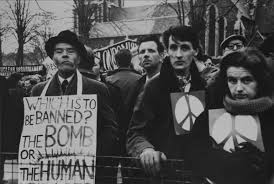In the decades following the Second World War, the question of what was to be done about the incredible destructive power of the nuclear bomb was at the forefront of much political discussion. The CND- or Campaign for Nuclear Disarmament- was founded in the UK in 1957 as a response to growing fears over the awesome power of nuclear weapons. Another topic that dominated the thoughts of the British public following the Second World War was what British identity was and what it could be in the years following imperialism: Frank Parkin wrote at the end of the 1960s that the CND represented progressive British values far more than the British government did, since the government had to rely on keeping the electorate happy
1. Parkin can be considered representative of the views that much of the British left held at the time, as the CND had enormous symbolic importance both as a voice against nuclear armament and against authority in general.
The emphasis on "British morality", idealised during the Second World War as a response to the horrors of Nazism, was clearly extremely important to those in the CND. Britain in particular was very divided politically at this point in time, as the Neo-Imperialist viewpoint that had risen as the British Empire began to lose territory and influence was a powerful force. The CND, being primarily left-wing, took opposition to the idea of imperialism and viewed it as the anathema to what Britain fought for during the Second World War
2. The marches on Aldermaston that became a yearly event had a strong emphasis on compassion towards fellow man and to create a world that would never repeat the horrors of that conflict.
 |
| CND protesters on one Aldermaston march |
The fact that much of the British populace held drastically opposing views shows the struggle to define British identity in an era where the Empire was being lost: the uncertainty even amongst the CND as to which issues should be contested shows that even those on one side of this divide were far from a united force. The Labour party during this period continued to criticise the idea of the UK being an independent nuclear power, even as they themselves were uncertain on their exact position on nuclear weapons. One point that cannot be argued is the CND's determination for nuclear disarmament, but the threat of Communism and the prospect of losing the empire left Britain uncertain of its place in the latter half of the 20th century. Memories of Britain being the world's strongest power were no longer the case, and although members of the CND liked to believe that Britain was a society built on moral values above all else, practicality was always likely to win out. The CND themselves became distracted by issues such as apartheid in South Africa and Rhodesia, as well as the discussion on race in general that was taking place at the time, and their influence on British politics and British society would only decline as nuclear war became less of an immediate possibility.
The argument that "British values" needed to be represented was used and has subsequently been used by many politicians from all sides of the political spectrum, and though the validity of this viewpoint can be debated, it can be said for sure that those who argued for it believed in it wholeheartedly.
1 Frank Parkin, Middle Class Radicalism: The Social Bases of the British Campaign for Nuclear Disarmament (Manchester: Manchester University Press, 1968)
↩
2 Jodi Burkett, Constructing Post-Imperial Britain: Britishness, 'Race' and the Radical Left in the 1960s (Berlin: Springer, 2013)
↩

No comments:
Post a Comment